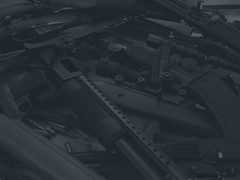Ryan: What are the common pitfalls in fiction where it’s clear that the author has never held or fired a modern firearm?Read the whole thing. Correia makes plenty of good points about how to pen firearms, but he includes an implicit supposition that I find valuable: While any bit of poorly understood detail can yank a reader out of a narrative, the subjects with which one should exercise particular care are those that 1) crop up regularly in stories; and 2) are likely to have been experienced by readers. Guns certainly fit the bill, as do subjects such as economics, sex, and religion. We ignore any of them at our compositional peril.
Larry: It isn’t just guns, but any topic where the reader is an expert and the author is clueless. The problem is that when you write something that the reader knows is terribly wrong, it kicks them right out of the story and ruins the experience for them. Guns are especially hard because they are super common in fiction, and there are tons of readers who know about them.
Most of these really glaring errors can be taken care of with a little bit of cursory research. Technical things can be taken care of by a few minutes on the manufacturer’s webpage, which will keep your characters from dramatically flipping off the safety on a gun that doesn’t have one.
Beyond that, however, is the actual use of the gun. The character using it should have a realistic amount of knowledge based on their skill, knowledge, ability, and training. If you are going to be writing about a character who is a professional gunslinger, then you need to do some research to make sure that person does what a professional gunslinger would do.
(Picture: CC 2006 by Keary O.)



No comments:
Post a Comment